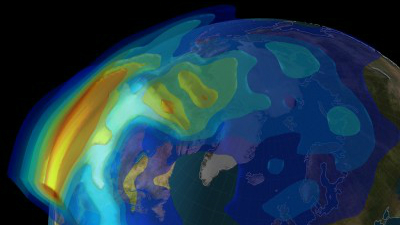The report, titled Extreme space weather: impacts on engineered systems and infrastructure’ has been published by the Royal Academy of Engineering and states that the UK should plan to mitigate the effects of a rare but potentially serious solar superstorm.
Professor Cathryn Mitchell from the Department of Electronic & Electrical Engineering was one of those involved in the construction of the report. She said: “Solar storms have an impact on engineered systems, and at Bath we are particular interested in the impact they have on the Global Positioning System, or GPS.
“Navigation, the national grid, internet banking, mobile phones, TV and aircraft landing systems are just a handful of applications that now rely on GPS, so understanding the impact of solar storms on GPS accuracy is increasingly essential.”
The Royal Academy of Engineering report has highlighted that while solar storms are relatively common, superstorms occur very rarely, perhaps every century or two. Most superstorms miss the Earth, travelling harmlessly into space. The last true solar superstorm, known as the ‘Carrington Event’, was in 1859.
However, a solar superstorm is inevitable at some point, and the report outlines how in the modern age, this poses significant concerns for the performance of electricity grids, satellites, GPS systems, aviation, and possibly mobile communications.
Professor Mitchell said: “At Bath we have already developed an internationally leading software package that mitigates against GPS navigation errors caused by space weather, called MIDAS.
“The software uses an advanced algorithm for imaging parts of the Earth’s atmosphere, and from this we are able to produce highly accurate three dimensional images. From these we can assess the impact of space weather on the atmosphere and allow for these in GPS navigation readings - increasing their accuracy.”
MIDAS is now licensed for research use in ten countries including the USA and China, and the research team at the University of Bath is continuing to develop and improve the accuracy.
The University has a significant and increasing presence in the field of space weather research based in its Centre for Space, Atmospheric and Oceanic Science. Professor Mitchell along with Professors David Jackson and Charles Curry input to the Royal Academy of Engineering report, and the group has also recently been joined by University Research Fellow Dr Biagio Forte.
The full Royal Academy of Engineering report can be downloaded (PDF). For more information on MIDAS see www.invert-bath.com.

